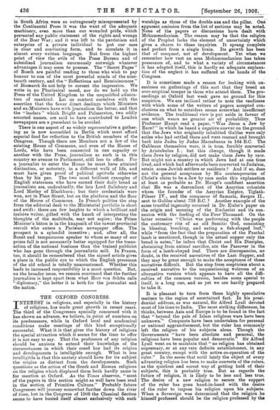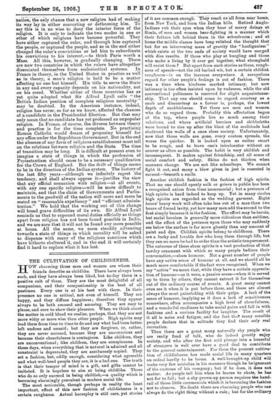THE OXFORD CONGRESS.
INTEREST in religions, and especially in the history of religions, has made great growth in recent years. The third of the Congresses specially concerned with it has shown an advance, we believe, in point of numbers on its predecessors, while in Oxford local and academical conditions make meetings of this kind exceptionally successful. What it is that gives the history of religions the special attraction which it seems for the time to offer it is not easy to say. That the professors of any religion should be anxious to extend their knowledge of the circumstances in which their creed has had its origins and developments is intelligible enough. What is less intelligible is that this anxiety should have for its subject the origins as distinct from the developments. Such questions as the action of the Greek and Roman religions on the religion which displaced them both hardly came in for mention at Oxford. As the Times observes, " most of the papers in this section might as well have been read in the section of Primitive Culture." Probably future Congresses will journey somewhat further down the river of time, but in the Congress of 1908 the Classical Section seems to have busied itself almost exclusively with such worships as those of the double axe and the pillar. One apparent omission from the list of sections may be noted. None of the papers or discussions have dealt with Mohammedanism. The reason may be that the religion of the Prophet lacks the element of uncertainty which gives a charm to these inquiries. It sprang complete and perfect from a single brain. Its growth has been that of conquest, not of development. Yet when we remember how vast an area Mohammedanism has taken- possession of, and to what a variety of circumstances it has adapted itself, this is hardly an adequate explana- tion of the neglect it has suffered at the hands of the Congress.
It is sometimes made a reason for looking with un- easiness on gatherings of this sort that they breed an over-sceptical temper in those who attend them. The pro- ceedings at Oxford last week gave no ground for this suspicion. We are inclined rather to note the readiness with which some of the writers of papers accepted con- clusions on what to outsiders seems somewhat insufficient evidence. The traditional view is put aside in favour of one which wears no greater air of probability. Thus Professor Haupt read. a paper, " Was Jesus a Jew by Race?" in which he based a negative answer on the ground that the Jews who originally inhabited. Galilee were only exiles who had settled there and were rescued and brought back into Judea by Judas Maccabaeus in 164 B.C. The Galileans themselves were, it is true, forcibly converted by Aristobulus I. ; but this change, though it made them Jews by religion, did not make them Jews by race. But might not a country in which Jews had at one time lived, and which had afterwards been converted to Judaism, retain some Jewish settlers or residents ? And if so, does not the general acceptance by His contemporaries of Christ's claim to be a Jew by race make this explanation at least as probable as Dr. Haupt's confident assertion that He was a descendant of the Assyrian colonists whom the founder of the Assyrian Empire, Tiglath- Pileser IV., and- the conqueror of Samaria, Sargon II., sent to Galilee about 738 B.C. ? Another example of the same trustful ingenuity occurred in Dr. Eisler's paper on the origin and meaning of the Eucharist and its con- nexion with the feeding of the Four Thousand. On the latter occasion " Christ was performing with the people the customary rite of an old Semitic God, consisting, in blessing, 'breaking, and eating a fish-shaped loaf," while "from the fact that the preparation of the Paschal lamb is mentioned, though in the actual supper only the bread is eaten," he infers that Christ and His Disciples,. abstaining from animal sacrifice, ate the Passover in the form of a lamb-shaped loaf. There are discrepancies, no doubt, in the received narratives of the Last Supper, and they may be great enough to make the acceptance of these narratives difficult. But the step from scepticism about a received narrative to the unquestioning welcome of an alternative version which appears to have all the diffi- culties of the common version, besides some special to itself, is a long one, and as yet we are hardly prepared to take it.
It is pleasant to turn from these highly speculative matters to the region of ascertained fact. In his presi- dential address, as was natural, Sir Alfred Lyall devoted most of his time to India. The most striking difference, he thinks, between Asia and Europe is to be found in the fact that " beyond the pale of Islam religious wars have been unknown. ' Conquests have been undertaken for personal or national aggrandisement, but the ruler has commonly left the religion of his subjects alone. Though the Governments " have been absolute and personal, the religions have been popular and democratic." Sir Alfred Lyall went on to maintain that " no religion has obtained supremacy, or at any rate definite establishment, in any great country, except with the active co-operation of the ruler." In the sense that until lately the object of every advancing religion has been to make converts of the rulers, as the quickest and surest way of getting hold. of their subjects, this is probably true. But as regards the future of religion, it is likely to be less and less true. The desire of a new religion to secure the support of the ruler has gone hand-in-hand with the desire of the ruler to impose his religion upon his subjects. When a Sovereign was determined that the religion he himself professed should be the religion professed by the nation, the only chance that a new religion had of making its way lay in either converting or dethroning him. To say this is in no wise to deny the interior force of the religion. It is only to indicate the two modes in one or other of which religions have become powerful. They have either captured the ruler, and through him captured the people, or captured the people, and so in the end either changed the ruler's convictions or led him to subordinate his convictions to his interest,—to think Paris worth a Mass. All this, however, is gradually changing. There are now two countries in which the rulers have altogether dissociated themselves from ecclesiastical systems. In France in theory, in the United States in practice as well as in theory, a man's religion is held to be a matter affecting no one but himself. His title to serve the State in any and every capacity depends on his nationality, not on his creed. Whether either of these countries has as yet quite adopted what Sir Alfred Lyall calls " the British Indian position of complete religious neutrality " may be doubted. In the American instance, indeed, religion has never, so far as we know, affected the chances of a candidate in the Presidential Election. But that may only mean that no candidate has yet professed an unpopular religion. In France, of course, the divorce between theory and practice is for the time complete. No practising Roman Catholic would dream of proposing himself for any office under the Republican Government. But in the end the absence of any form of religious establishment must tell on the relations between religion and the State. The time of transition may be long. It is difficult at present even to imagine a state of things in which the profession of Protestantism should cease to be a necessary qualification for the Crown of England. But the drift of things seems to be in the direction of the Indian system. The history of the last fifty years—although we infinitely regret the tendency, and shall always oppose it—justifies the view that any official connexion with religion—at all events, with any one specific religion—will be more difficult to maintain, and that the claim of Governments and Parlia- ments to the goodwill of the nation will more and more be rested on " reasonable expediency " and " efficient adminis- tration." We hold that the working out of this change will breed grave difficulties of its own. Sir Alfred Lyall reminds us that to expound moral duties officially as things apart from religion has not been found possible in India, and we are sure that it will not be found any more possible at home. All the same, we seem steadily advancing towards a state of things in which morality will be asked to dispense with many of the religious sanctions which have hitherto sheltered it, and in the end it will certainly find it hard to replace what it has lost.











































 Previous page
Previous page